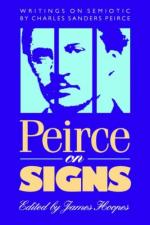|
This section contains 9,646 words (approx. 33 pages at 300 words per page) |

|
SOURCE: "History and the Collapse of Eternity," in Boundary 2: An International Journal of Literature and Culture, Vol. 22, No. 3, Fall, 1995, pp. 33-55.
In the following excerpt, Cochran uses Peirce's essay "Evolutionary Love" to examine the latter's idealism and acknowledgement of historical materialism.
1
Since the advent of the modern state, every cultural and political economy has required a coherent and compatible sense of the past, present, and future. This sometimes implicit historical understanding, with its attendant categories of knowledge and value, endows any present with stability by mediating between the need for continuity with the past and the inevitability of disruptive change. A quandary in historical understanding occurs when disruptive change outdistances the capacity to integrate it; at its most extreme, this quandary touches on the very concept of historical protagonist, a central element of all historical thought. In modernity, however, when a transcendent deity gradually ceased being viewed as...
|
This section contains 9,646 words (approx. 33 pages at 300 words per page) |

|


